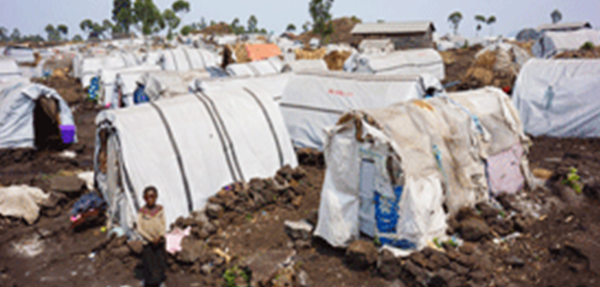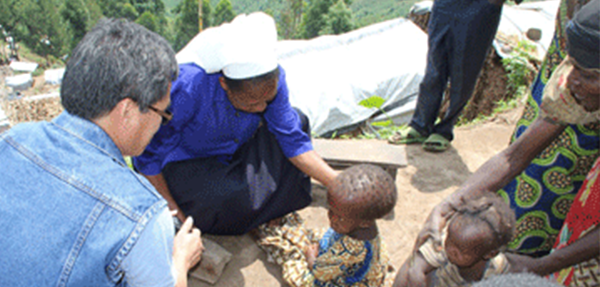Jesuit Refugee Services: Workers in the midst of dangers
According to UNHCR, there are more than 50 million refugees around the world, half of which are women and children.
Fr. Romy Cagati, SVD currently works with the Jesuit Refugee Service (JRS) where he has been since September 2001. In October 2013, he was appointed the Regional Human Resources Officer of JRS Great Lakes region that comprises the countries of the DR Congo, Rwanda & Burundi. He is presently based in the JRS Regional Office in Bujumbura (Burundi). Fr. Romy shares his missionary journey.
Working with the refugees
My first assignment was in Tanzania which was part of JRS East Africa region. I worked among Burundian, Congolese and Rwandan refugees in five refugee camps in Kigoma region (Northwest of Tanzania). While doing fulltime psycho-pastoral work in the camps, I was also the Country Director of JRS Tanzania.
After seven years of working with JRS East Africa (Sept 2001 – August 2008), I went for a sabbatical year in Ireland (Sept 2008 – Oct 2009). When I’ve finished my sabbatical year and with the approval of Fr. General and his Council, I rejoined JRS in November 2009. And this time, I was requested to work in the Great Lakes region. First, I worked in Burundi as Projects Coordinator for two JRS projects – a Food Security Project for returnees (refugees who have returned from Tanzania) and an Education Project (Enhancing Quality Education & Rebuilding School Infrastructure in war affected areas) in the Province of Rutana. I stayed in Burundi for 1½ years.
From Burundi, I went to the DR Congo. I was appointed Country Director of JRS DR Congo. JRS works among the internally displaced people (IDP) in the Province of North-Kivu. I stayed there for two years (August 2011 – Sept 2013).
Security and Socio-political Situation in the DR Congo
The socio-political situation in the DRC remains volatile. Recurrent armed and ethnic conflicts in Eastern DRC in the past two decades have displaced hundreds of thousands of people. Left with no choice, they live in makeshift huts or tents in internally displaced people (IDP) camps inside the country or in refugee camps in different host countries in the region. It is estimated that the IDPs in the DRC would number about 2.6 million.
There are more than 20 armed rebel groups in Eastern DRC. One of them is the FDLR (Forces Démocratiques de Libération du Rwanda – literally it means, Democratic Liberation Forces of Rwanda). Originally, it was part of the group responsible for the Rwandan genocide of 1994. Now, the members are mixed. There are even Congolese fighters of Rwandan Hutu origin in the group. The UN Security Council has given the group six months (May 2014 – Jan 2, 2015) to disarm. However, only 300 non-essential combatants out of its approximately 1500 to 2000 members disarmed as of Jan 3, 2015. The UN and the DR Congo government extended the deadline to February 2015, but they just ignored it. The Congolese Army is now pursuing them.
It goes without saying that this again has caused displacement for thousands of people. Equally, JRS’s activities in the field are greatly affected. In one of our projects in a place called Mweso, where there is a strong FDLR presence, we had to pull out our JRS team because of insecurity. In fact, one member of the team has received death threats. In the same place, an assistant parish priest by the name of Abbé Jean-Paul was assassinated on February 25, 2015. At 21h30 an armed man came to the parish and shot him dead. He was in his thirties and was a priest for just three years. The common belief is that the assassin is a member of FDLR. This incident led to the hasty departure of the team.
The JRS International Office in Rome and the JRS Regional Office in Bujumbura (Burundi) have decided that everybody should leave before somebody else gets killed. The Office of JRS cum residence is just beside the parish compound. Understandably, this has greatly traumatized the team. It was only last week that some essential members of the team gradually started to return to Mweso.
Rising Socio-political Temperature in Burundi
Burundi is host to about 57,700 Congolese refugees and 9,000 asylum seekers. They are located in four different refugee camps – two camps in the Province of Ruyigi and two camps in the Province of Muyinga. There are however a good number of them living as urban refugees in the city of Bujumbura. In partnership with UNHCR, JRS works in the area of Education, Professional Vocational Training, and Self-Sufficiency & Income Generating Activities. The new MOU was signed in February 2015.
Burundi is relatively peaceful this past decade. Notwithstanding, the socio-political situation these days is very worrisome. In May and June 2015, Burundi will hold its communal, parliamentary and presidential elections. Pierre Nkurunziza, the incumbent President of Burundi finishes his two terms ( a term is for five years) in office in May 2015. In spite of a strong opposition for him to run for a third term his political party, the CNDD-FDD, has officially announced in April 25 that he is the party’s official candidate for the presidential election. The response of the opposition parties and the civil society was a public demonstration that resulted into violence and deaths. They vow to continue to hold public demonstrations until President Nkurunziza would renounce to run for a third term.
As the election days approach, the situation becomes explosive. Some opposition leaders are in prison or under house arrest. JRS is now drawing up a Security Contingency Plan for the security of its staff, including eventual evacuation for its international staff in the event that the situation deteriorates into a civil war. I do hope it will not. At the moment I don’t feel any imminent threats to our staff nor to my personal security.
Fr. Romy relates: “I am living with five Jesuits in their community in Kiriri, Bujumbura. There is a military outpost nearby and two well-armed soldiers are posted every evening inside the compound. While we feel relatively safe, the place could also be an easy target when the situation worsens.” Fr. Romy, Godspeed and stay out of danger.










